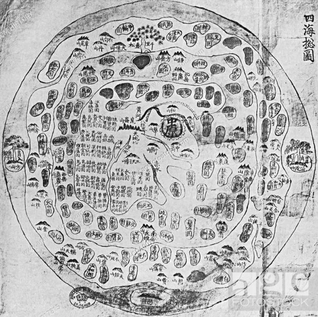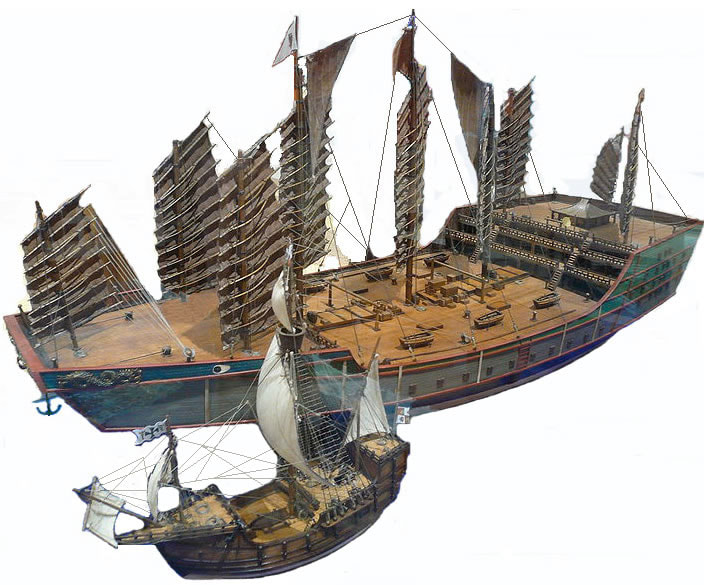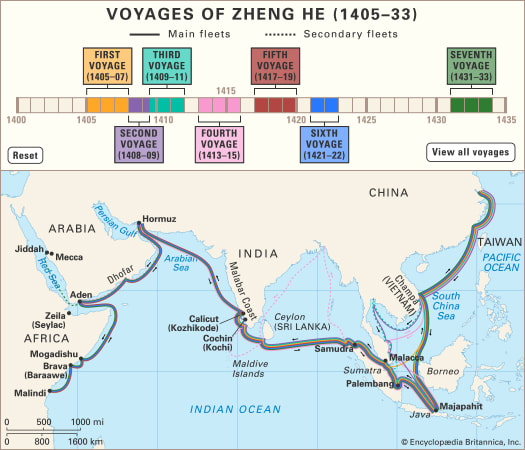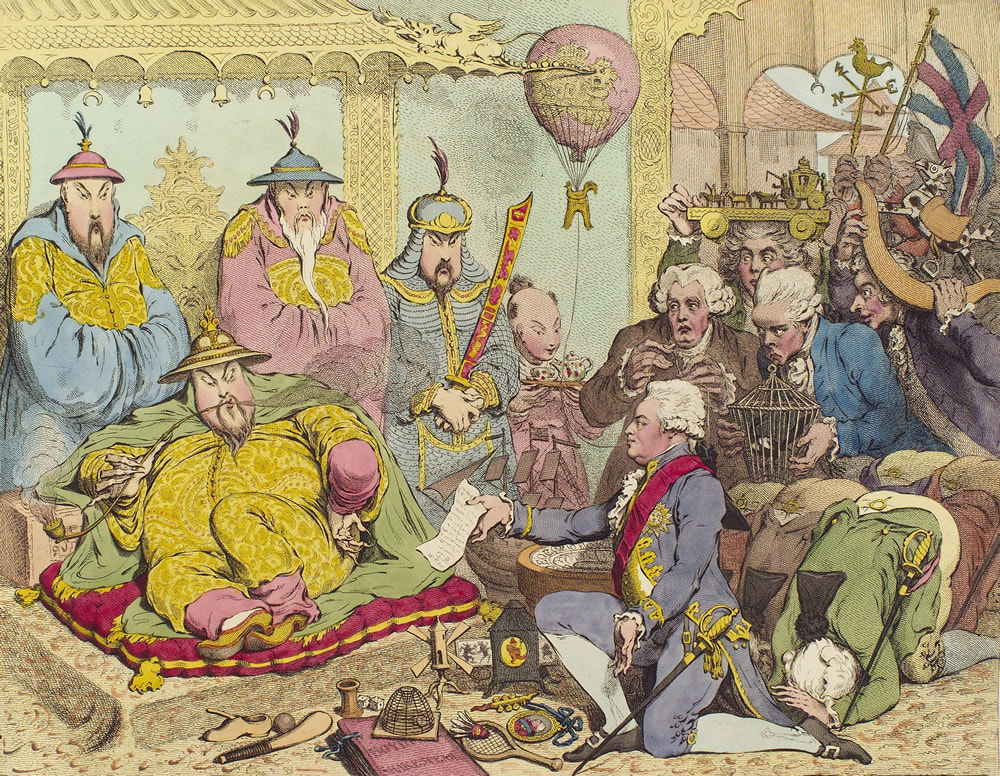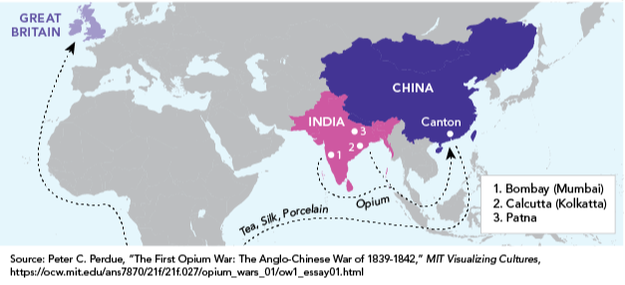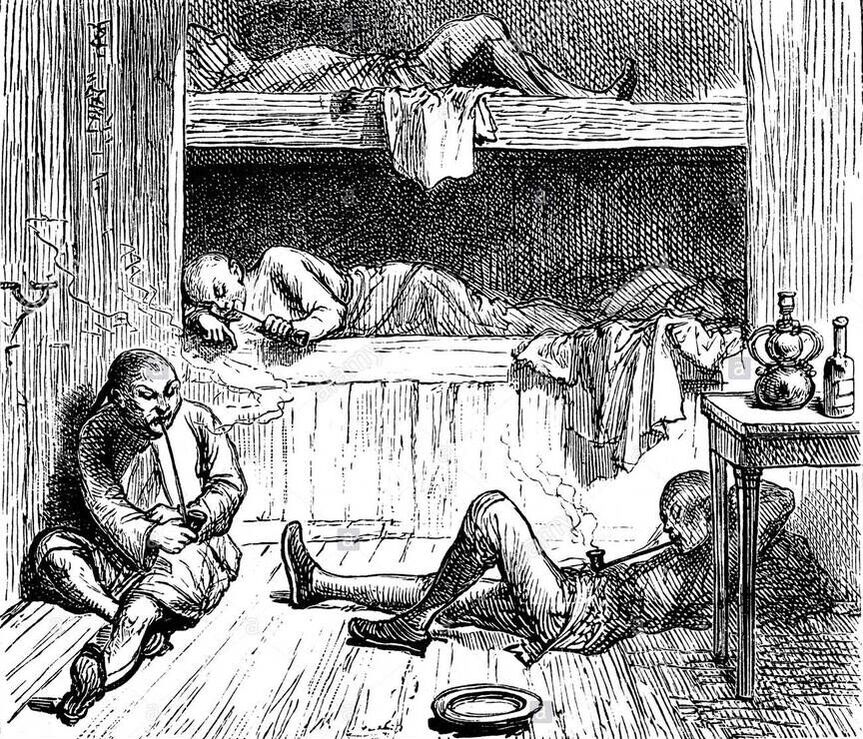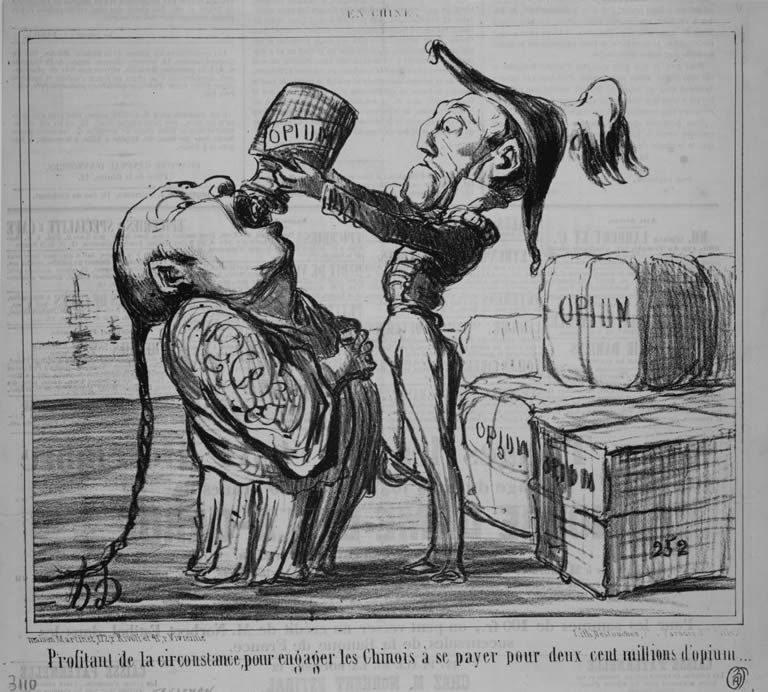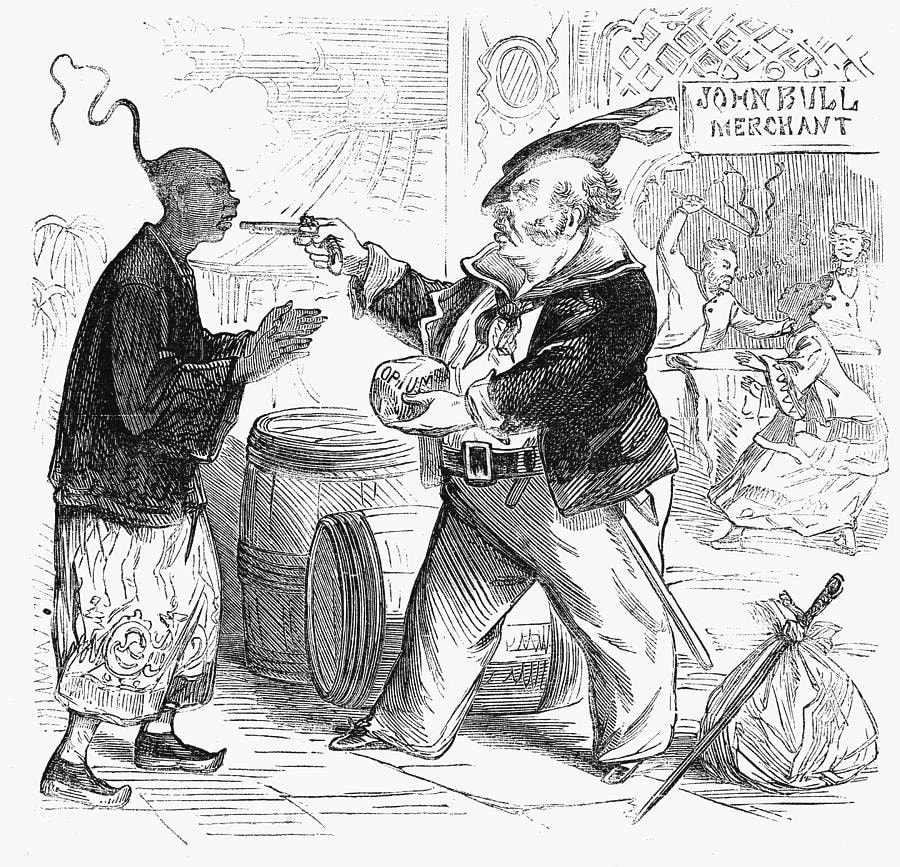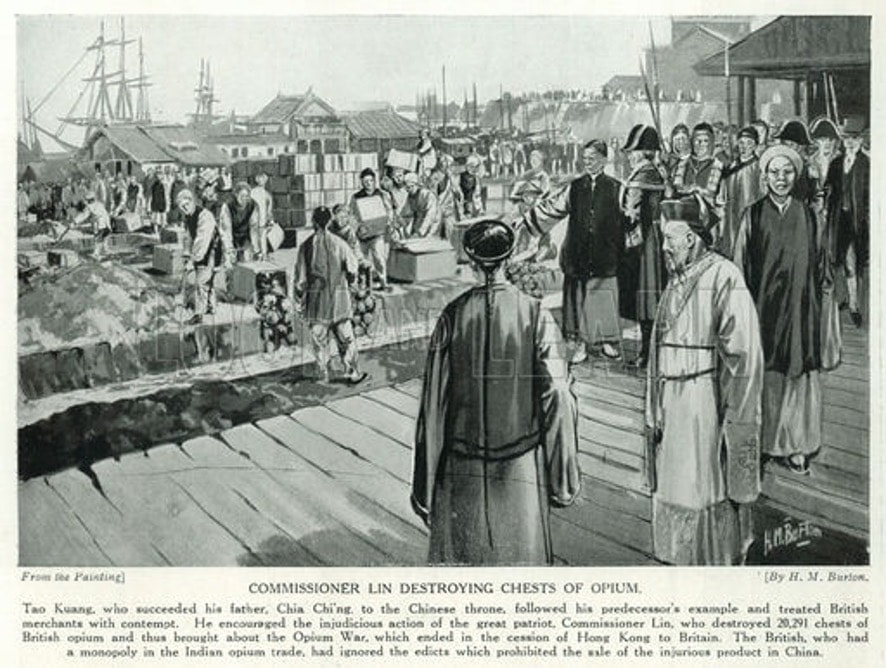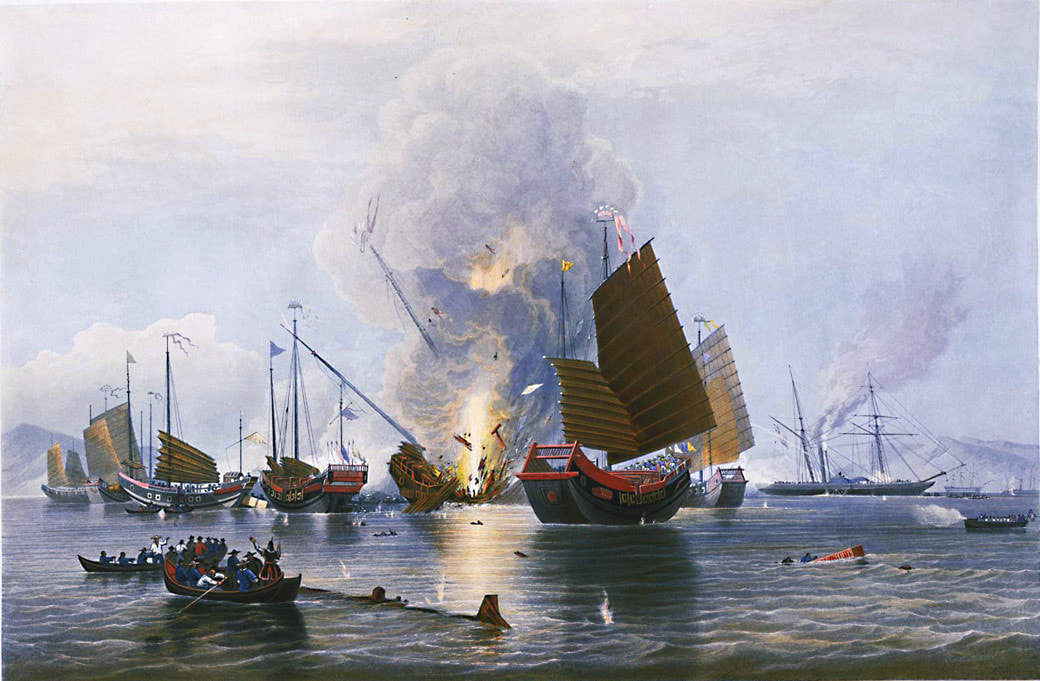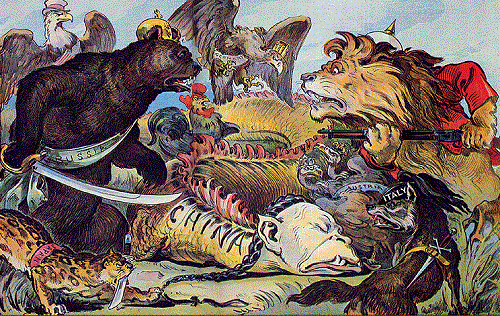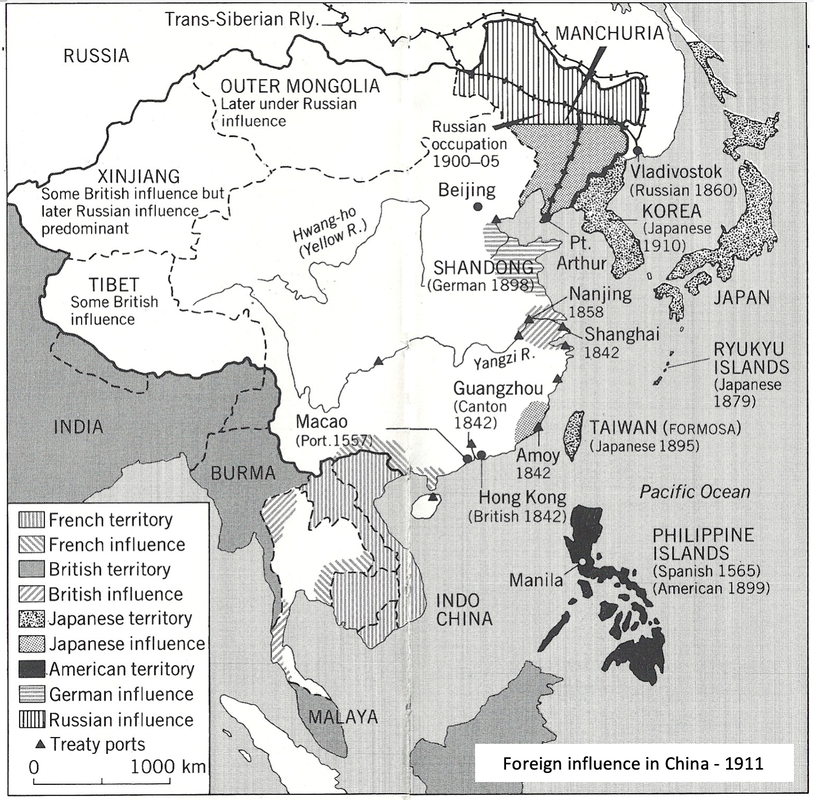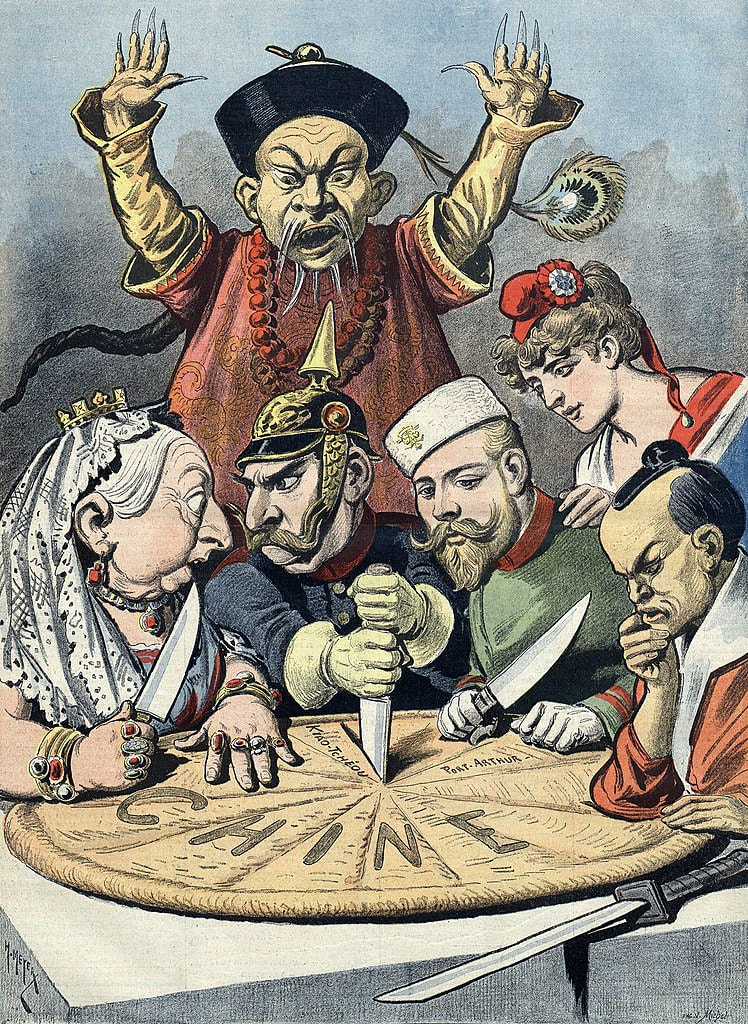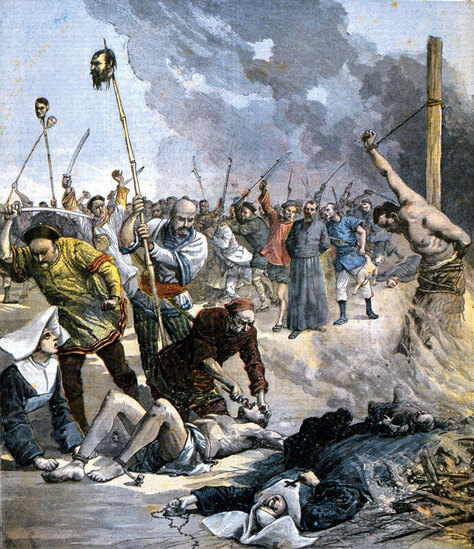Lesson 4 - Imperialism in China
|
The Chinese language does not use the system of letters familiar to speakers of European languages. It uses characters and ideographs.
Characters
The earliest Chinese characters were pictographs. A pictograph is a symbol that visually represents an object. |
|
Ideographs
Today's Chinese characters are referred to as ideographs, of which there are simple ideographs and compound ideographs. A simple ideograph is a character that represents an idea rather than an object. A compound ideograph is comprised of two or more simple ideographs - the word is thereby the combined meaning of the ideographs as in the following example: |
Two main systems have been used to transcribe Chinese into English. Most books published before the 1980s used the older Wade-Giles system. Using this method, China's capital city was known as Peking and the Chinese leader was Mao Tse-tung. The Pinyin system of transcription is now in common usage. Therefore, Beijing is the name of the Chinese capital and Mao Zedong is the name of the Chinese leader. For the most part, pronunciation of consonants in the Pinyin style are much as they would be in English, but there are some exceptions. Thus c is pronounced ts, q is pronounced ch and x is pronounced sh.
In what ways was China an advanced civilisation?
|
There was good reason for China's global superiority complex. Before the 15th century and on most indicators of development, China was hundreds of years ahead of European civilisation. Most importantly, China had enjoyed an efficient, centralised system of government hundreds of years before Europeans. The Chinese could also claim many great achievements - including being the first to invent: paper, gunpowder, waterproof lacquer, money, drought-resistant rice, asbestos suits, credit cards, acupuncture, the compass, the rudder, seismographs for measuring earthquakes, and printing. They also had crossbows, cast iron and mechanical clocks many hundreds of years before Europeans. For more on Chinese achievements see this video and 20 Chinese inventions.
At the beginning of the nineteenth century China believed it was culturally superior to the rest of the world. It saw itself as the 'Middle Kingdom' where smaller states including modern day Korea, Tibet and Vietnam, accepted an inferior 'tributary status'. (Map) |
If this superiority can be summed up in one image this it. Zheng He' s (pronounced Jung Ha) 'Treasure Ship' next to Christopher Columbus' flagship.
|
|
Zheng He's ship and voyages predate Columbus by nearly 100 years. In the 1400s, China owned the greatest seagoing fleet in the world, up to 3,500 ships at its peak. (The U.S. Navy today has only 430). Between 1405 and 1433 seven Chinese ‘treasure voyages’ were undertaken that used ships and technology well in advance of European navigation and 27,000 sailors, larger than the population of most European medieval towns. Evidence emerged in 2023 that he may even have reached Australia. See this Guardian report. |
Activity 1
Explain why China in the 15th century might have been considered the most important civilisation in the world. Yet, China did not become the world's first industrial power. From your knowledge about why Britain became the first country to industrialise, can you propose some reasons why China did not industrialise, what do you think China might have lacked?
Explain why China in the 15th century might have been considered the most important civilisation in the world. Yet, China did not become the world's first industrial power. From your knowledge about why Britain became the first country to industrialise, can you propose some reasons why China did not industrialise, what do you think China might have lacked?
|
Extension
One of the most influential works of history in recent times is Guns, Germs and Steel by Jared Diamond. (See film right). Diamond seeks to explain why 'European societies, rather than those of the Fertile Crescent or China or India, the ones that colonized America and Australia, took the lead in technology, and became politically and economically dominant in the modern world'. Have a look at this edited extract and see if you can explain in your own words the reasons Diamond gives for China's failure to become a modern power. |
|
What were the causes of conflict between China and the West?
Direct maritime trade between Europe and China began with the Portuguese in the 16th century, which leased an outpost at Macau starting from 1557. But China did not want to develop contacts with the West. They resisted contact with European culture and attempted to prevent European merchants, who were increasingly interested in China, from entering the country. The Chinese authorities attempted a 'closed door' policy (Canton policy), which allowed only a limited amount of trade with the Europeans, and this could only take place in a restricted number of ports and under strict regulations. The Europeans were only permitted to enter small areas in these designated ports. They could not go outside of these areas. Ordinary Chinese people could not meet the European traders, and if any Chinese national was caught teaching the Chinese language to foreigners, they faced the death penalty.
Long-term causes of war
A key issue for the merchants was that trade was made very expensive for them as the Chinese insisted on being paid in silver for their goods. Silver made transcontinental trade expensive because it needed to be insured against piracy. This meant trade was 'one way' as the Chinese would not accept any Western goods in exchange for their tea and silk.
Direct maritime trade between Europe and China began with the Portuguese in the 16th century, which leased an outpost at Macau starting from 1557. But China did not want to develop contacts with the West. They resisted contact with European culture and attempted to prevent European merchants, who were increasingly interested in China, from entering the country. The Chinese authorities attempted a 'closed door' policy (Canton policy), which allowed only a limited amount of trade with the Europeans, and this could only take place in a restricted number of ports and under strict regulations. The Europeans were only permitted to enter small areas in these designated ports. They could not go outside of these areas. Ordinary Chinese people could not meet the European traders, and if any Chinese national was caught teaching the Chinese language to foreigners, they faced the death penalty.
Long-term causes of war
A key issue for the merchants was that trade was made very expensive for them as the Chinese insisted on being paid in silver for their goods. Silver made transcontinental trade expensive because it needed to be insured against piracy. This meant trade was 'one way' as the Chinese would not accept any Western goods in exchange for their tea and silk.
|
They considered Europeans to be barbaric with nothing of value to trade with China.
In 1793 an important British mission, led by Lord Macartney, went to China with instructions from King George III to set up diplomatic relations and trade agreements. (See the famous contemporary British satirical cartoon by James Gillray left) The mission brought with it gifts for the Emperor but it failed to secure trade agreements. To the Chinese, the idea of trading with Britain as an equal was abhorrent, and they viewed the mission not as an equal diplomatically but as one from a 'tribute' state paying homage to the Emperor. An imperial response to the mission was sent to George III: |
Our dynasty's majestic virtue has penetrated unto every country under Heaven, and Kings of all nations have offered their costly tribute by land and sea. As your Ambassador can see for himself, we possess all things. I set no value on objects strange or ingenious, and have no use for your country's manufactures. This then is my answer to your request to appoint a representative at my Court, a request contrary to our dynastic usage, which would only result in inconvenience to yourself. I have expounded my wishes in detail and have commanded your tribute Envoys to leave in peace on their homeward journey. It behoves you, O King, to respect my sentiments and to display even greater devotion and loyalty in future, so that, by perpetual submission to our Throne, you may secure peace and prosperity for your country hereafter. Besides making gifts (of which I enclose an inventory) to each member of your Mission, I confer upon you, O King, valuable presents in excess of the number usually bestowed on such occasions, including silks and curios-a list of which is likewise enclosed. Do you reverently receive them and take note of my tender goodwill towards you!
|
The short-term causes of war - opium
Opium is a narcotic drug that for centuries had been used medicinally to relieve pain. Originally opium had been popular in European cities - where the bars known as 'opium dens' were set up (see right). Due to the horrific impact of opium addiction on the general public, European governments banned the drug. This meant that the growing companies needed a new market. The idea of selling the opium to China in exchange for tea seemed an ideal solution to British merchants. |
|
|
The British introduced the drug as a recreational habit to be smoked with tobacco and being highly addictive, smoking opium quickly took hold in China. The main company trading with China was the British East India Company. This company had sponsored the growing of opium poppies in India. In response the Chinese passed two laws banning the importation of the drug in 1729 and 1796. To get around this ban, and continue making huge profits, the East India Company began to sell opium to Chinese merchants who were able to smuggle it into China.
Despite the bans the opium trade grew and grew. The trade was so lucrative that merchants from other countries, including Portugal, France and America, also got involved. |
Activity 2
Explain how opium became central to European trade with China.
How useful are these contemporary cartoons as evidence about the opium trade in China?
How useful are these contemporary cartoons as evidence about the opium trade in China?
|
Towards war
In 1838, Emperor Dao Guang, who ruled from 1820 to 1850, sent Commissioner Lin Zexu to Guangzhou (Canton) to finally end the opium trade. Lin ordered the confiscation of all the British merchants' opium supplies. In all, 20,283 chests of the drug were seized and destroyed. The merchants were furious. The new Superintendent of Trade in China, Captain Charles Elliott, then promised the merchants compensation from the British government. Tension between Britain and China intensified. The trigger for the outbreak of war came as the result of the murder of a Chinese national by drunken British sailors in a fight in the city of Kowloon. |
Charles Elliott paid compensation to the Chinese man's family, but the Chinese authorities wanted the accused handed over to stand trial, the British refused, arguing that the men would not get a trial under Chinese law as confessions were extracted under torture. They also objected to the public execution the men faced if they were found guilty.
|
The First Opium War 1839-42
In retaliation, the Chinese blockaded and stopped food supplies to foreigners. The British response was to send warships to Guangzhou to 'protect their interests'. The Chinese underestimated the power of the newly industrialised British navy and its steam ships. 'The English barbarians are an insignificant and detestable race, trusting entirely to their strong ships and large guns: but the immense distance they have traversed will render the arrival of seasonal supplies impossible and their soldiers after a single defeat, being deprived of provisions will become dispirited and lost. (An official report to the Emperor before the conflict) |
These warships then destroyed a large number of inferior Chinese war junks, leading to a huge loss of life. The British were then expelled from Guangzhou - which led to 20 warships being sent to China with 4000 troops on board. These bombarded Guangzhou and then sailed up and down the coast, causing and widespread destruction. The First Opium War lasted from 1839 until 1842. The British forces were better trained and better armed. The Chinese were fighting to stop the import of opium into their country - and the British fought to protect this lucrative trade.
The war ended with the signing of the Treaty of Nanjing.
Treaty of Nanjing
The terms of the treaty included:
The Manchu rulers were not consulted on the terms of the treaty, nor did they have any choice but to sign it. British ships threatened to again bombard Chinese coastal towns until the treaty was signed. This was the first 'unequal treaty'. It was unequal because Chinese interests were completely ignored. After the war, opium flowed into China in ever increasing quantities. The Chinese authorities could only impose harsher and harsher punishments on users to try to cut down on the drug use. France, the Netherlands and the USA increased their involvement in selling opium in China too. Shanghai became a symbol of the new relationship with a rapid expansion of trade and a thriving foreign community of merchants, particularly British. Here they created, at the centre of a Chinese community, a part of England, with an Anglican Church and an English Public School. In 1855, 437 foreign ships entered the port and the numbers continued to grow
The war ended with the signing of the Treaty of Nanjing.
Treaty of Nanjing
The terms of the treaty included:
- Four additional ports were to be opened up to trade with the West.
- The British were no longer to be subject to Chinese law - but were to be subject to the laws of their own country (extraterritoriality).
- The British were to have special rights in areas where they lived, called 'Concession Areas'.
- The Chinese had to pay 21 million silver dollars in compensation for the war. They also had to pay for all the opium they had destroyed.
- In all future dealings, China had to treat Britain as an 'equal'.
- Britain was to be given the port city of Hong Kong.
- Britain was given 'most favoured nation' status, which meant that it could demand the same rights granted by China to any other country.
The Manchu rulers were not consulted on the terms of the treaty, nor did they have any choice but to sign it. British ships threatened to again bombard Chinese coastal towns until the treaty was signed. This was the first 'unequal treaty'. It was unequal because Chinese interests were completely ignored. After the war, opium flowed into China in ever increasing quantities. The Chinese authorities could only impose harsher and harsher punishments on users to try to cut down on the drug use. France, the Netherlands and the USA increased their involvement in selling opium in China too. Shanghai became a symbol of the new relationship with a rapid expansion of trade and a thriving foreign community of merchants, particularly British. Here they created, at the centre of a Chinese community, a part of England, with an Anglican Church and an English Public School. In 1855, 437 foreign ships entered the port and the numbers continued to grow
Activity 3
What were the causes of the First Opium War and what were the main consequences for China?
What were the causes of the First Opium War and what were the main consequences for China?
The Second Opium War 1856-60
Another war broke out between China and Britain in 1856. This time the war was triggered by an incident involving a ship called the Arrow. The ship was flying a British flag - although it was owned by a Hong Kong Chinese - and it was boarded by Chinese officials who believed that there were some well-known pirates on board. The Chinese police arrested the crew but in the struggle that followed the British flag was torn down. The British were furious and ordered the release of the crew and an official apology for the treatment of the flag. The Chinese returned the crew but did not apologise. Chinese gangs attacked and set fire to British homes and warehouses and the British warships bombarded Guangzhou. War broke out again, and again the Chinese were humiliated.
The war ended in 1858 with another unequal treaty, the Treaty of Tientsin.
Tension remained high between the British and the Chinese - the latter attempted to resist fully implementing the unequal treaties. In 1860 British and French troops were sent to Beijing to enforce the terms of the treaties. While they were there, the troops looted and burnt the Imperial Summer Palace and forced the Emperor to flee into exile. The violence was widespread and the Chinese were again forced to sue for 'peace' and grant even more concessions . China had been utterly defeated and demoralised. A contemporary British comment makes clear the importance of the war and the subsequent treaty:
By this war we have practically opened out the trade of the Yangtze River, whence a vastly increased commerce is to be expected. We have inflicted a severe blow upon the pride of the Hsien—feng Emperor that the whole face of Chinese politics and our relations with that country must change, before he will dare insult our flag or obstruct our commerce. (Lt Col G J Wolseley)
Activity 4
What were the causes of the Second Opium War and what were the consequences for China?
Another war broke out between China and Britain in 1856. This time the war was triggered by an incident involving a ship called the Arrow. The ship was flying a British flag - although it was owned by a Hong Kong Chinese - and it was boarded by Chinese officials who believed that there were some well-known pirates on board. The Chinese police arrested the crew but in the struggle that followed the British flag was torn down. The British were furious and ordered the release of the crew and an official apology for the treatment of the flag. The Chinese returned the crew but did not apologise. Chinese gangs attacked and set fire to British homes and warehouses and the British warships bombarded Guangzhou. War broke out again, and again the Chinese were humiliated.
The war ended in 1858 with another unequal treaty, the Treaty of Tientsin.
- Six more ports were opened to foreign trade.
- Opium importation to China was made legal with a small import duty.
- Christian missionaries were to be given complete freedom to convert people.
- Europeans were allowed to travel anywhere in China without restriction.
- Ambassadors of European countries were allowed to set up residence in Beijing - the Imperial capital.
Tension remained high between the British and the Chinese - the latter attempted to resist fully implementing the unequal treaties. In 1860 British and French troops were sent to Beijing to enforce the terms of the treaties. While they were there, the troops looted and burnt the Imperial Summer Palace and forced the Emperor to flee into exile. The violence was widespread and the Chinese were again forced to sue for 'peace' and grant even more concessions . China had been utterly defeated and demoralised. A contemporary British comment makes clear the importance of the war and the subsequent treaty:
By this war we have practically opened out the trade of the Yangtze River, whence a vastly increased commerce is to be expected. We have inflicted a severe blow upon the pride of the Hsien—feng Emperor that the whole face of Chinese politics and our relations with that country must change, before he will dare insult our flag or obstruct our commerce. (Lt Col G J Wolseley)
Activity 4
What were the causes of the Second Opium War and what were the consequences for China?
Further Chinese humiliation
A further clash with France developed in the 1880s, over the French consolidation of its hold on Vietnam. Traditionally, Vietnam like Korea occupied a tributary status with regard to Imperial China. The rulers of both Vietnam in the south and Korea in the north recognised the lordship if not the direct rule of the Emperor in Beijing. The French brutally severed any link, destroying a Chinese fleet in Fuzhou in August 1884, in the process. Five Frenchmen and 521 Chinese men died.
A further clash with France developed in the 1880s, over the French consolidation of its hold on Vietnam. Traditionally, Vietnam like Korea occupied a tributary status with regard to Imperial China. The rulers of both Vietnam in the south and Korea in the north recognised the lordship if not the direct rule of the Emperor in Beijing. The French brutally severed any link, destroying a Chinese fleet in Fuzhou in August 1884, in the process. Five Frenchmen and 521 Chinese men died.
|
In 1894 Qing China suffered a serious humiliation over the other tributary state, Korea, and this time at the hands of an Asiatic power, Japan. Japan, newly reformed and invigorated, was anxious to extend its influence into Korea at China's expense. A rebellion in Korea against the monarchy there led both powers to rush in troops. A ship carrying Chinese reinforcements was sunk by a Japanese cruiser and for good measure Japanese forces crossed into Chinese territory proper, seizing the port of Lushun in Manchuria and even the Shandong peninsula near to Beijing itself. The Treaty of Shimoneseki was more humiliating than that of Nanjing in 1842. China abandoned Korea and even ports in China to Japan. In 1898 and 1899, China almost seemed on the point of partition between the imperialist powers.
|
The Russians who had forced the Japanese out of some of their gains, notably the port of Lushun, now occupied much of Manchuria and Lushun, renaming it Port Arthur.
|
The Germans occupied a port in the Shandong peninsula and the British, not to be outdone and to stop anyone else having it took Weihaiwei. They also extended their hold on the south by extracting a 99-year lease on the Kowloon Peninsula to the north of Hong Kong. The French also seized territory in the south.
Activity 5
With reference to the map and the text above, explain how the French, Japanese, Russians, Germans and the USA gained influence in South East Asia at the expense of the Chinese in the late 19th century.
With reference to the map and the text above, explain how the French, Japanese, Russians, Germans and the USA gained influence in South East Asia at the expense of the Chinese in the late 19th century.
The failure of self-strengthening and the Boxer Rising
The Chinese Qing government seemed helpless and unable to defend Chinese sovereignty. This led some Chinese officials to realise that the country would remain weak unless an effort was made to learn Western technology. The leading reformers believed that modernisation should be introduced, but without abandoning the Confucian way of life. In other words, their aim was not to Westernise China but to build a strong defence against the foreign powers. The modernising movement was known as the 'self-strengthening' movement. But the Empress Dowager Cixi, who effectively ruled China from 1861 until her death in 1908, did not believe in reform. There was no attempt to introduce a full programme of industrial and social change. Industrialisation was impossible without social change. For example, the first railway was built in China in 1876 (see below a photograph of its opening) but was dismantled a year later. As a result of this failure to modernise, China was unable to resist the influence of foreign powers.
In this situation, popular feeling in north-east China erupted into what became known as the Boxer Rising. Tension had been growing for some time over western missionaries and their Christian converts. In the spring of 1900 isolated incidents coalesced into a mass frenzy of anti-western outrage. It was fuelled by a mixture of primitive magical beliefs and outraged Han pride. Railways which were spreading in the north were thought to disturb dragons, and telegraph wires which dripped rusty water after rain were regarded as sources of poison. Europeans and even those Chinese in possession of dangerous foreign objects such as clocks were killed.
The Chinese Qing government seemed helpless and unable to defend Chinese sovereignty. This led some Chinese officials to realise that the country would remain weak unless an effort was made to learn Western technology. The leading reformers believed that modernisation should be introduced, but without abandoning the Confucian way of life. In other words, their aim was not to Westernise China but to build a strong defence against the foreign powers. The modernising movement was known as the 'self-strengthening' movement. But the Empress Dowager Cixi, who effectively ruled China from 1861 until her death in 1908, did not believe in reform. There was no attempt to introduce a full programme of industrial and social change. Industrialisation was impossible without social change. For example, the first railway was built in China in 1876 (see below a photograph of its opening) but was dismantled a year later. As a result of this failure to modernise, China was unable to resist the influence of foreign powers.
In this situation, popular feeling in north-east China erupted into what became known as the Boxer Rising. Tension had been growing for some time over western missionaries and their Christian converts. In the spring of 1900 isolated incidents coalesced into a mass frenzy of anti-western outrage. It was fuelled by a mixture of primitive magical beliefs and outraged Han pride. Railways which were spreading in the north were thought to disturb dragons, and telegraph wires which dripped rusty water after rain were regarded as sources of poison. Europeans and even those Chinese in possession of dangerous foreign objects such as clocks were killed.
'Railways carried "fire-carts" and rattling, iron-wheeled wagons all over the country, desecrating burial places, disturbing the spirits of the earth, putting honest carters and porters, trackers and boatmen, muleteers and camel men out of work. Equally obnoxious were the foreign operators of the chugging steamships on the inland waterways, the foreign mining engineers whose deep shafts upset the feng-shui even more than the railway tracks did, the foreign mechanics who put up the wires and the poles for the telegraph companies.
[A member of the Boxer movement commented:]
'The iron roads and iron carriages are disturbing the terrestrial dragon and are destroying the earth's beneficial influences... the red liquid which keeps dripping from the iron snake [the rust coloured rain water that dripped from the telegraph wires] is nothing but the blood of the out-raged spirits of the air.'
Quoted in Hibbert, C. 1970. The Dragon Wakes: China and theWest, 1793-1911.
|
Mobs from the countryside spread to Tianjin and Beijing. The German ambassador was shot and Europeans retreated to the British legation (embassy) to withstand a siege. Diplomats, foreign civilians, and soldiers as well as Chinese Christians in the Legation Quarter were besieged for 55 days by the Imperial Army of China and the Boxers. The Empress Dowager Cixi in control of the Qing court threw her support behind the Boxers, in effect declaring war on the west. It was popular but hopeless.
In August 1900, an Eight Nation Alliance of American, Austro-Hungarian, British, French, German, Italian, Japanese, and Russian troops lifted the siege 20,000 armed troops and summarily executed those suspected of being Boxers. The Boxer Protocol of 7 September 1901 provided for the execution of government officials who had supported the Boxers, provisions for foreign troops to be stationed in Beijing. The Qing court fled to Xi'an far to the west. Massive damages - approximately $10 billion at 2018 silver prices and more than the government's annual tax revenue—to be paid as indemnity over the course of the next 39 years to the eight nations involved. |
Activity 6
Explain the 'self-strengthening' movement and explain how it failed and why the Boxer rebellion resulted in the final humiliation for the Chinese.
Explain the 'self-strengthening' movement and explain how it failed and why the Boxer rebellion resulted in the final humiliation for the Chinese.
Edited and adapted extract from Geoff Stewart – China 1900-76
|
|
Extension and extras
Sal Khan does a short video on the Opium Wars |




